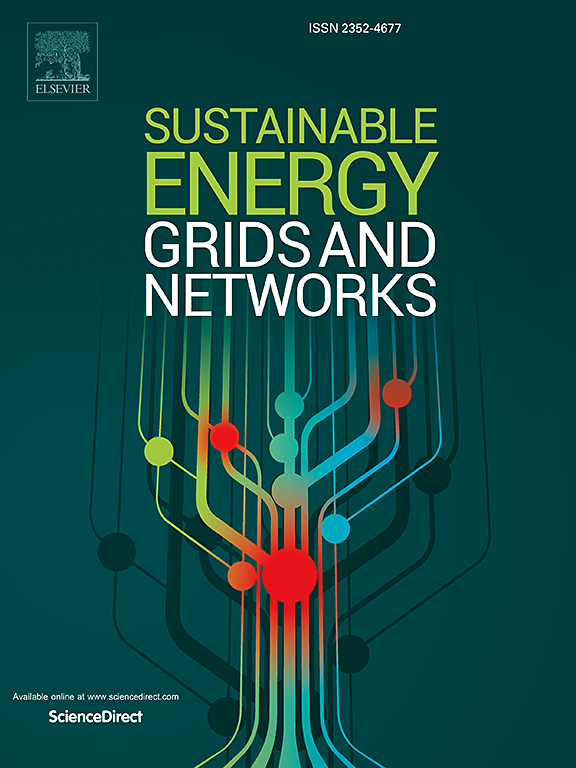柔性现货市场中基于多相似性度量的层次-光谱聚类市场出清机制
IF 5.6
2区 工程技术
Q2 ENERGY & FUELS
引用次数: 0
摘要
由于电力需求的增加和分布式能源的整合,现代电力系统面临着日益严重的拥堵问题。灵活市场提供了一个很有前途的解决方案,它使系统运营商能够通过实时现货交易来激励消费或生产转移。然而,市场机制必须保持清算的可追溯性,尽管灵活性提供者的数量不断增加,投标结构也越来越复杂。本文提出了一种基于亲和矩阵聚集的层次-光谱聚类方法来提高市场出清性能。该方法基于flexumer的地理位置、电邻近度和行为偏好,通过聚合亲和矩阵形成网络感知集群。基于9241总线的PEGASE测试系统在IEEE 33总线和大型配电网上的仿真结果表明,计算负担和经济结果之间存在明显的权衡。值得注意的是,该框架可以减少市场出清时间,同时保持可接受的经济效率水平,为设计可扩展的灵活性市场提供有价值的见解。本文章由计算机程序翻译,如有差异,请以英文原文为准。
A market-clearing mechanism based on hierarchical-spectral clustering with multiple similarity measures for flexibility spot markets
Modern power systems face increasing congestion issues due to rising electricity demand and the integration of distributed energy resources. Flexibility markets offer a promising solution to deal with congestion by enabling system operators to incentivize consumption or production shifts through real-time spot trades. However, market mechanisms must maintain clearing tractability despite the expanding number of flexibility providers and the complexity of bid structures. This paper presents a hierarchical-spectral clustering approach with affinity matrix aggregation to improve market-clearing performance. The proposed method forms network-aware clusters by aggregating affinity matrices based on flexumers’ geographical location, electrical proximity, and behavioral preferences. The simulation results on the IEEE 33-bus and a large-scale distribution grid, based on the 9241-bus PEGASE test system, demonstrate a clear trade-off between computational burden and economic outcomes. Notably, the framework can reduce market-clearing times while maintaining acceptable levels of economic efficiency, providing valuable insights for the design of scalable flexibility markets.
求助全文
通过发布文献求助,成功后即可免费获取论文全文。
去求助
来源期刊

Sustainable Energy Grids & Networks
Energy-Energy Engineering and Power Technology
CiteScore
7.90
自引率
13.00%
发文量
206
审稿时长
49 days
期刊介绍:
Sustainable Energy, Grids and Networks (SEGAN)is an international peer-reviewed publication for theoretical and applied research dealing with energy, information grids and power networks, including smart grids from super to micro grid scales. SEGAN welcomes papers describing fundamental advances in mathematical, statistical or computational methods with application to power and energy systems, as well as papers on applications, computation and modeling in the areas of electrical and energy systems with coupled information and communication technologies.
 求助内容:
求助内容: 应助结果提醒方式:
应助结果提醒方式:


